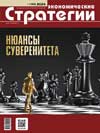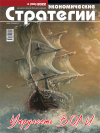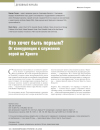The Problem of Marriage Stability in Modern Russia: Theological and Sociological Analysis
DOI: 10.33917/es-1.193.2024.100-107
The article examines the problem of sustainability of marriage unions in modern Russia. The author reviews the opinions of Orthodox theologians and sociologists on the causes of this phenomenon and identifies two main concepts: the crisis concept and the progressive one. It is argued that the common underlying cause of family destabilization is weakening of faith in the Triune God, manifested in selfishness, fornication, distorted ideas about gender equality, disorderly parental intervention and excessive concern with economic issues. As a conclusion, it is proposed to further develop Orthodoxy’s efforts to affirm the unsurpassed valu of marriage according to “once for a lifetime” formula and to reveal its deep relationship with the teaching of the Church.
References:
1. Aleksandra Romanova, strtp. Darite lyubov’ (Dnevnikovye zapisi) [Give Love (Diary Entries)]. Moscow, 2010, pp. 26, 27.
2. Preobrazhenskiy I.V. Otechestvennaya Tserkov’ po statisticheskim dannym s 1840–1841 po 1890–1891 gg. [The Russian Church According to Statistical Data from 1840–1841 to 1890–1891]. Saint Petersburg, 1901, pp. 65, 71.
3. Engel’s F. Proiskhozhdenie sem’i, chastnoy sobstvennosti i gosudarstva: Marks K., Engel’s F. Sochineniya [The Origin of the Family, Private Property and the State: K. Marx, F. Engels. Works]. Vol. 21, Moscow, 1961, pp. 85, 118.
4. Materialy po statistike Leningrada i Leningradskoy gubernii [Materials on the Statistics of Leningrad and the Leningrad Province]. Vyp. 6, Leningrad, 1925, p. 202.
5. Dinamika naseleniya SSSR 1960–1980 gg. [Dynamics of the USSR Population 1960–1980]. Moscow, 1985, p. 44.
6. Chislo brakov i razvodov za god [Number of Marriages and Divorces per Year]. Rosstat. URL: https://www.fedstat.ru/indicator/31566; https://www.fedstat.ru/indicator/31604
7. Razvody: “uvazhitel’nye” i “neuvazhitel’nye” prichiny [Divorces: “Valid” and “Non-valid” Reasons]. Fond “Obshchestvennoe mnenie”, 2022, 14 iyulya, available at: https://fom.ru/Rabota-i-dom/14750
8. Rossiya i strany mira. 2016 [Russia and Countries of the World. 2016]. Stat. sb. Moscow, 2016, pp. 49–52.
9. Otnoshenie rossiyan k razvodam [Russians’ Attitude Towards Divorce]. VTsIOM, 2021, 11 avgusta, available at: https://wciom.ru/analytical-reviews/analiticheskii-obzor/ot-braka-do-razvoda-1990-2021
10. Ioann Zlatoust, svyatitel’. 9-ya beseda na 1-e poslanie k Timofeyu: Izbrannye tvoreniya: Sobranie poucheniy [9th Discourse on the First Epistle to Timothy:
Selected Creations. Collection of Teachings]. Vol. 1, Moscow, 1993. S. 352.
11. Georgiy (Shestun), igum. (vposl. — arkhimandrit). Pravoslavnaya sem’ya. Voprosy i otvety [Orthodox Family. Questions and Answers]. Azbuka, available at: https://azbyka.ru/deti/pravoslavnaya-sem-ya-voprosy-i-otvety-igumen-georgij-shestun
12. Osnovy sotsial’noy kontseptsii Russkoy Pravoslavnoy Tserkvi [Basics of the Social Concept of the Russian Orthodox Church]. M., 2019.





